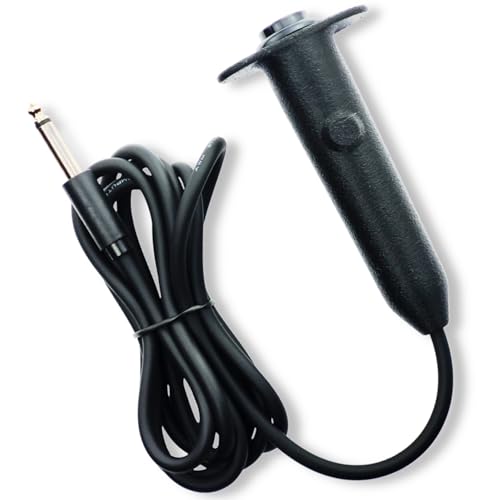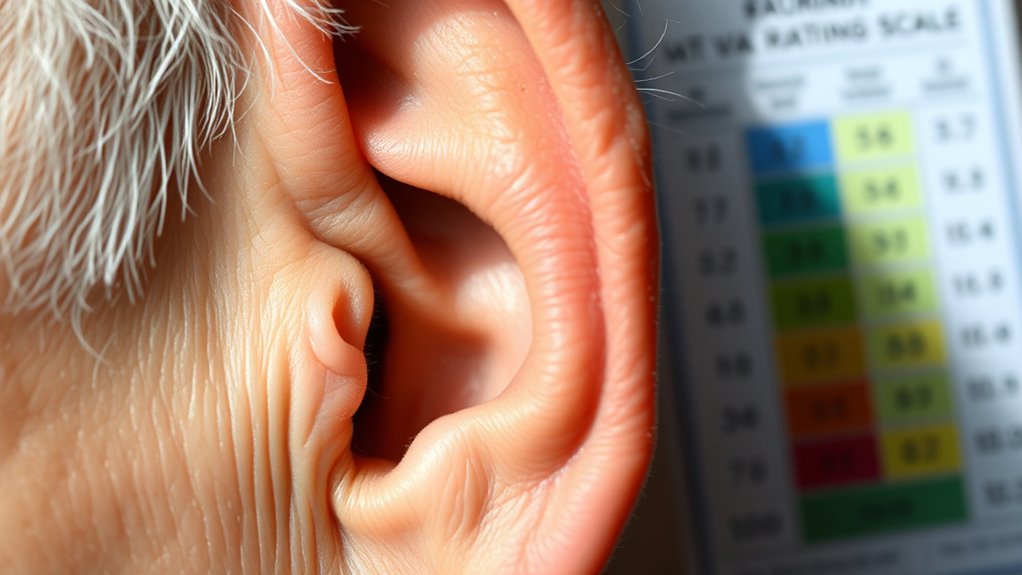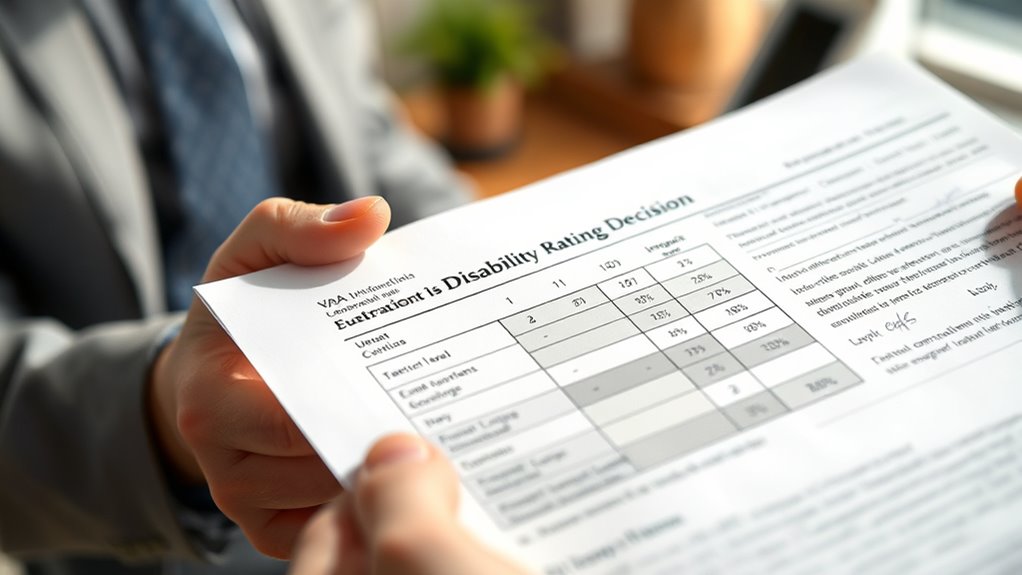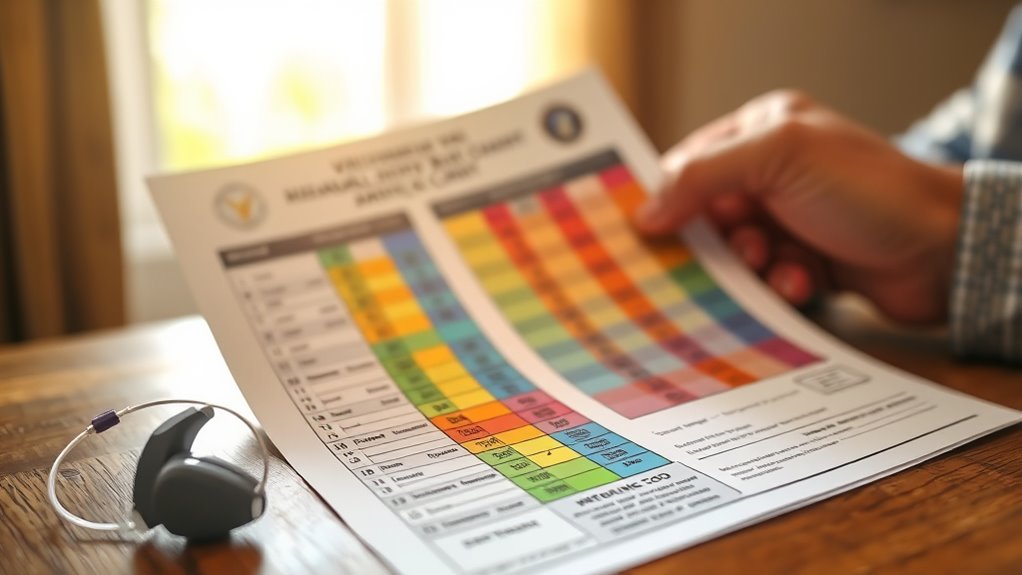To understand VA disability ratings for hearing loss, know that they rely on audiometric and speech discrimination tests that measure how well you hear different tones and understand speech. These results are plotted on a standardized scale from 0% to 100%, with higher impairment earning more points. Your medical history, hearing aid use, and everyday hearing challenges also influence your rating. If you’re curious about how the process works and what affects your score, continue exploring for detailed guidance.
Key Takeaways
- VA uses audiometric testing and speech discrimination scores to determine hearing loss severity and corresponding disability ratings.
- Ratings range from 0% to 100%, based on specific audiogram results and impact on daily communication.
- Precise calibration and standardized testing conditions are essential for accurate assessment and appropriate rating assignment.
- Medical records, audiograms, and witness testimonies support claims and can influence rating adjustments or appeals.
- Ongoing management like hearing aids and documented life impacts are considered when evaluating the degree of disability.

Audien Atom One OTC Hearing Aids – Wireless, Rechargeable, and Comfortable | Clear Sound in a Small, Discreet Design for Seniors & Adults with Hearing Loss
Hear What Matters Most: Hearing isn’t one-size-fits-all. That’s why our adjustable frequency system lets you personalize your sound…
As an affiliate, we earn on qualifying purchases.
As an affiliate, we earn on qualifying purchases.
How the VA Determines Hearing Loss Severity

The VA determines hearing loss severity primarily through standardized hearing tests that measure your ability to hear different tones at various volumes. These tests evaluate how well you can detect sounds across various frequencies, providing a clear picture of your hearing health. If you wear hearing aids, the VA considers how much they improve your hearing, which influences your disability rating. Ear infections can cause temporary or long-term hearing issues, and if they’ve contributed to your hearing loss, you should document this history. The VA looks at the results of these tests along with your medical history to assign a rating. This process helps guarantee your disability compensation reflects the true extent of your hearing impairment. Additionally, AI-driven security systems are increasingly used to protect sensitive medical data involved in disability assessments, ensuring accuracy and privacy in the evaluation process.

Audiometer Patient Response Button for Hearing Tests | Audiologist-Trusted Audiometry Switch | Rated 500,000+ Clicks | Universal 1/4" Plug | Magnetic for Sound Booths
Ultra-sensitive response – Activates with a light touch, ideal for elderly patients, children, or those with limited dexterity
As an affiliate, we earn on qualifying purchases.
As an affiliate, we earn on qualifying purchases.
The Role of Audiometric Testing in Rating Assignments

Audiometric testing plays a crucial role in determining your VA disability rating for hearing loss because it provides objective measurements of your hearing abilities. During the test, an audiogram is created, illustrating your hearing thresholds across various frequencies. Proper audiogram interpretation helps the VA assess the severity of your loss accurately. These results also guide decisions about hearing aid technology, guaranteeing you receive devices suited to your specific needs. The test results are essential for establishing a baseline and tracking any changes over time. Accurate audiometric data ensures you get an appropriate rating and benefits. By relying on precise measurements, the VA can better understand your hearing impairment, making audiometric testing a cornerstone in the rating process. Incorporating audiometric testing techniques from Volkswagen Tuning can improve the accuracy of performance assessments, emphasizing the importance of precise calibration and measurement.

MU) OLYMPUS WS-110 DIGITAL AUDIO REC
Professional-grade digital voice recorder
As an affiliate, we earn on qualifying purchases.
As an affiliate, we earn on qualifying purchases.
Understanding the VA’s Rating Scale for Hearing Loss

Understanding how the VA assigns disability ratings for hearing loss can seem complex, but it’s based on a standardized scale that reflects the severity of your impairment. The VA uses audiometric test results to determine your rating, which ranges from 0% to 100%. Mild hearing loss may result in a lower rating, while profound loss scores higher. If your hearing loss is severe enough, you may be eligible for a hearing aid, as the VA considers hearing aid eligibility based on your audiometric thresholds. Additionally, if you experience tinnitus related to your hearing loss, it can influence your overall disability rating. The scale helps guarantee your rating accurately reflects your level of hearing impairment, guiding your access to benefits and treatment options. Understanding best modern toilet features can also help in making accessible and efficient choices for your home environment.

Jamar Discriminator, Therapy Discrimination Tool for Physical and Occupational Therapy, Touch-Test 2 Point, Tests Patient Sensory Stimulus Perception for Rehabilitation and Recovery from Nerve Injury
Pair of two discrimination ocatgon tools for measuring stationary and moving two-point discrimination
As an affiliate, we earn on qualifying purchases.
As an affiliate, we earn on qualifying purchases.
The Impact of Speech Discrimination Scores

Your speech discrimination scores play a vital role in determining your VA disability rating for hearing loss. These scores can influence your overall rating, especially when combined with audiometric results. It’s important to understand how testing conditions might affect these scores and your resulting disability evaluation. Accurate analysis of speech discrimination is essential, as advances in AI technology, such as Natural Language Processing (NLP), can improve the assessment of communication abilities and support more precise evaluations.
Role of Speech Scores
Have you ever wondered how speech discrimination scores influence VA disability ratings for hearing loss? These scores reflect your speech clarity and auditory processing ability, which are critical for effective communication. When your scores are low, it signals difficulty understanding speech, affecting daily life. Consider how this impacts you:
- You struggle to follow conversations in noisy environments.
- Your ability to work or socialize diminishes.
- You feel isolated from loved ones.
- Your confidence in communication drops.
- These scores are also an important part of understanding the broader hearing health picture.
VA evaluates these scores to determine how much your hearing loss impairs your hearing function. They provide a clearer picture of your auditory processing capabilities, which helps decide your disability rating. Ultimately, speech scores reveal the real-world impact of your hearing loss on your life.
Influence on Rating
Speech discrimination scores directly influence how the VA determines your disability rating because they measure how well you understand speech despite hearing loss. Higher scores often mean better functional hearing, which can lower your overall rating. Factors like hearing aid considerations and tinnitus co-occurrence also impact this evaluation. For example, even if your hearing loss is significant, good speech discrimination can suggest effective hearing aid use, possibly reducing your rating. Conversely, poor scores indicate difficulty understanding speech, which may increase your disability percentage. The following table illustrates how speech scores relate to hearing conditions:
| Speech Score | Hearing Aid Consideration | Tinnitus Co-occurrence |
|---|---|---|
| High (90-100%) | Often improves understanding | Can worsen perception |
| Moderate (60-89%) | May require hearing aids | May interfere with clarity |
| Low (<60%) | Likely ineffective without aids | Often worsens hearing issues |
Understanding these factors helps you grasp how speech discrimination impacts your VA rating, especially considering auditory processing capabilities that influence speech comprehension.
Testing Conditions
Testing conditions play an essential role in determining speech discrimination scores, as they directly affect the accuracy and consistency of the results. A controlled testing environment ensures reliable measurements, minimizing external noise or distractions. Your audiologist’s qualifications are critical—they must be experienced to interpret results correctly and adapt testing conditions if needed. Consider these factors that can impact your score:
- The clarity of the testing environment
- The audiologist’s expertise and attentiveness
- Consistency in testing procedures
- Proper calibration of audiometric equipment
- The use of appropriate self monitoring techniques during testing to ensure accurate results
Any deviation, like a noisy room or an inexperienced audiologist, can lead to inaccurate scores. Accurate testing conditions are fundamental for proper VA disability evaluations, helping you receive the rating you deserve.
How to Read Your VA Disability Rating Decision

Understanding how to read your VA disability rating decision is essential for knowing what benefits you’re entitled to. Your decision letter outlines your disability percentage, which directly impacts your monthly compensation. Look for the section that lists your service-connected conditions, such as hearing loss or tinnitus. The rating percentage indicates the severity of each condition; for example, a higher percentage may qualify you for additional benefits like hearing aid coverage or tinnitus management programs. The letter also explains how the VA assessed your hearing tests and any medical evidence considered. If you disagree with any part of the decision, it provides instructions for filing an appeal. Carefully reviewing this document helps you understand your current benefits and what steps to take next. Additionally, understanding the disability rating process can help you better navigate potential future claims or appeals.
Factors That Can Influence Your Hearing Loss Rating

Several factors can impact the severity of your hearing loss rating, influencing the percentage the VA assigns. Your history of noise exposure, whether on the battlefield or at work, can worsen your condition and lead to a higher rating. Age-related loss also plays a role, as natural aging can compound existing damage. Additionally, other elements include: 1. The duration and intensity of noise exposure—long-term exposure can cause more significant damage. 2. How your hearing loss affects daily life—greater impact often results in a higher rating. 3. Whether your loss is sudden or gradual—sudden loss may be viewed differently. 4. The presence of other medical issues that contribute to hearing deterioration. Understanding these factors helps you grasp what influences your VA hearing loss rating and what to contemplate moving forward. The role of hearing technology can also influence how your condition is evaluated based on the available assistive devices.
Steps to Appeal or Increase Your Hearing Loss Rating

If you believe your VA disability rating for hearing loss doesn’t reflect your current condition, you can take specific steps to appeal or seek an increase. First, gather new evidence showing your hearing has worsened, including recent audiograms and notes on how your condition affects daily life. Consider exploring therapy options, such as hearing aids or assistive devices, which can demonstrate ongoing management of your hearing loss. You can also submit a supplemental claim or request a re-evaluation from the VA. If your initial appeal is denied, filing a Notice of Disagreement and working with a VA representative can help strengthen your case. Staying proactive and providing updated medical evidence increases your chances of securing a higher rating. Additionally, understanding the VA disability rating process can help you navigate your options more effectively.
Tips for Gathering Evidence to Support Your Claim

To strengthen your claim, focus on gathering solid medical documentation that clearly shows your hearing loss. Witness testimony can also be powerful, especially if others can describe how your condition affects daily life. Keep detailed records consistently to build a clear, compelling case for your disability rating.
Medical Documentation Importance
Gathering solid medical documentation is essential to supporting your VA disability claim for hearing loss. Accurate audiogram interpretation shows the extent of your hearing damage, providing clear evidence of your condition. To strengthen your case:
- Obtain recent audiograms from qualified audiologists to document hearing thresholds.
- Ask your provider for detailed reports explaining your hearing loss and how it impacts daily life.
- Include records of hearing aid technology used, showcasing your ongoing treatment efforts.
- Ensure medical notes highlight any treatments or therapies that address your hearing issues.
This documentation paints a compelling picture of your hearing health, making it easier for VA reviewers to understand your challenges and grant a fair disability rating. Your thorough records can make all the difference.
Witness Testimony Value
Witness testimony can be a powerful addition to your VA disability claim, especially when medical records alone might not fully capture how hearing loss affects your daily life. To maximize its impact, guarantee your witness’s testimony has credibility by choosing someone who regularly observes your hearing difficulties. Their account should detail specific instances where hearing loss caused challenges, like misunderstandings or safety concerns. The witness impact is most convincing when their observations are consistent and detailed, providing a personal perspective that complements medical evidence. Clear, credible testimony helps strengthen your claim by illustrating real-life effects that might not be fully documented elsewhere. Remember, the goal is to demonstrate how hearing loss influences your daily functioning, making witness credibility and impact vital to your case.
Consistent Record Keeping
Maintaining consistent records is essential for building a strong VA disability claim for hearing loss. Proper document organization and record maintenance ensure you have solid evidence when needed. To strengthen your case, consider:
- Regularly updating and organizing your medical records related to hearing issues.
- Keeping detailed logs of hearing difficulties and their impact on daily life.
- Saving all communication with healthcare providers and VA representatives.
- Storing audiograms and treatment notes in a secure, accessible place.
These steps help you build an emotional case rooted in clear, organized evidence. Consistency in record keeping not only makes your documentation more compelling but also reduces stress when submitting your claim. You’ll feel more confident knowing your evidence is thorough and well-maintained.
Frequently Asked Questions
Can Hearing Loss Qualify for a Total Disability Rating?
Hearing loss can qualify for a total disability rating if it considerably impairs your ability to work or perform daily activities. The VA assigns disability ratings based on the severity of your hearing impairment, with higher ratings indicating more severe loss. If your hearing loss is profound and affects your communication skills or employment, you might be eligible for a 100% disability rating, providing you with full benefits and support.
How Long Does It Take to Receive a VA Hearing Loss Decision?
When you file for VA hearing loss benefits, it typically takes several months to get a decision. The VA reviews your claim, which may include a medical examination, and this process can be delayed if additional evidence or an appeal process is needed. If your claim is denied or you disagree with the rating, you can start an appeal process. Staying proactive and providing thorough documentation helps speed up your hearing loss decision.
Do VA Ratings Differ for Service-Connected Versus Non-Service-Connected Hearing Loss?
Your VA rating will differ for service-connected versus non-service-connected hearing loss because the rating criteria focus on how your hearing loss relates to your military service. Service-connected hearing loss receives ratings based on the severity linked to your service, often resulting in higher benefits. Non-service-connected cases are rated solely on the hearing loss severity, which may lead to different or lower ratings, depending on the specific assessment results.
Are There Special Considerations for Veterans With Asymmetrical Hearing Loss?
If you have asymmetrical hearing loss, VA considers the differing severity between ears when evaluating your claim. The agency might assign separate ratings or combine them based on overall impairment, especially if one ear’s loss is more severe. Service connection plays a key role, as establishing it can impact your eligibility and rating. Make sure to provide detailed audiological evidence to support your claim for asymmetrical hearing, ensuring accurate assessment.
How Do Tinnitus and Hearing Loss Ratings Interact?
You might wonder how tinnitus correlation affects your hearing loss rating. The VA combines tinnitus and hearing loss ratings using a rating combination method, which accounts for overlapping symptoms without stacking them simply. Tinnitus can be rated separately, but when combined, it might slightly increase your overall disability rating. It’s crucial to understand how the VA calculates this combined rating to make sure you receive the appropriate compensation for both conditions.
Conclusion
Understanding how the VA rates hearing loss can considerably impact your disability benefits. Did you know that nearly 1.2 million veterans received VA disability compensation for hearing loss in 2022? By knowing the rating process and gathering strong evidence, you can improve your chances of getting the rating you deserve. Stay informed, advocate for yourself, and don’t hesitate to appeal if needed — your hearing health and benefits are worth it.










